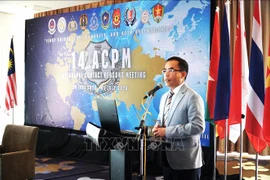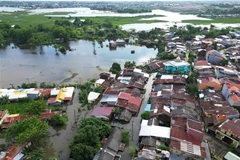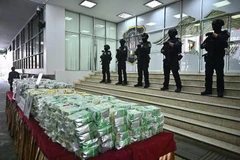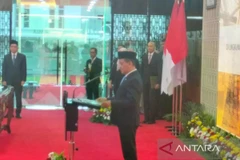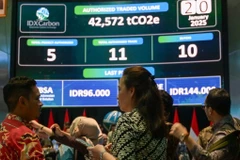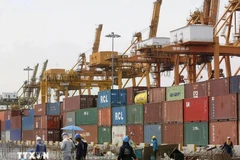Kuala Lumpur (VNA) - The Asean National Police (ASEANAPOL) will prioritise the elimination of scam call centres linked to trafficking in persons and forced criminal activities as part of its regional action plan this year, Director for Plans and Programmes of the ASEANAPOL Secretariat Police Senior Lieutenant-Colonel Nguyen Huu Ngoc has said.
Speaking to the media on the sidelines of the Asia 2025 International Security Summit and Expo (AISSE) in Putrajaya on January 20, Ngoc said Malaysia is particularly affected, with many victims being trafficked and smuggled to countries such as Myanmar, Cambodia, and the Philippines.
The action plan focuses on obtaining a comprehensive picture of crime trends, identifying law enforcement gaps, and addressing training needs among the 10 ASEAN member countries, he told a summit session titled Digital Technology and Transnational Crime: Emerging Threats to National Security in the ASEAN Region”.
He added that ASEANAPOL is coordinating training capacity-building initiatives and establishing an anti-scam centre, while also supporting police operations to tackle cyber scams in Southeast Asia, with Malaysia as a key focus.
Ngoc revealed that a new initiative targeting cybercrime was submitted during the 42nd ASEANAPOL Conference held in Myanmar in October 2024. The resolution has been adopted by the chiefs of police from all 10 member countries. This year, the ASEANAPOL Secretariat will develop an action plan to implement the resolution. The initiative includes coordinating efforts to dismantle scam call centres and mitigating transnational crimes linked to cyber scams, which often result in the exploitation and trafficking of individuals.
He acknowledged the challenges in fostering collaboration among ASEAN member states, particularly in terms of information sharing, and also encouraged greater transparency and collaboration to strengthen law enforcement efforts across the region.
Malaysia, Singapore and Thailand have established robust national-level operational models to combat scams. However, he said that at the international level, challenges arise when funds are transferred across borders. In such cases, ASEANAPOL coordinates with international organisations and countries outside the region to recover assets and funds that have been transferred illegally, according to the official.
Earlier in his presentation, Ngoc said ASEANAPOL also gathered and analysed data on crime situations reported by these countries, focusing on 10 core crime areas, including human trafficking, wildlife crime, cybercrime, transnational fraud, and more. The data collected is used to produce analytical reports that shed light on crime trends across Southeast Asia and to identify gaps in law enforcement capabilities among member states.
He added cyber fraud has emerged as one of the most critical threats in Southeast Asia, often linked to human trafficking and forced criminal activities. In Cambodia, Laos and Myanmar, these criminal networks are responsible for stealing approximately 43.8 billion USD each year through scams, amounting to nearly 40% of the combined formal GDP of the three nations./.


